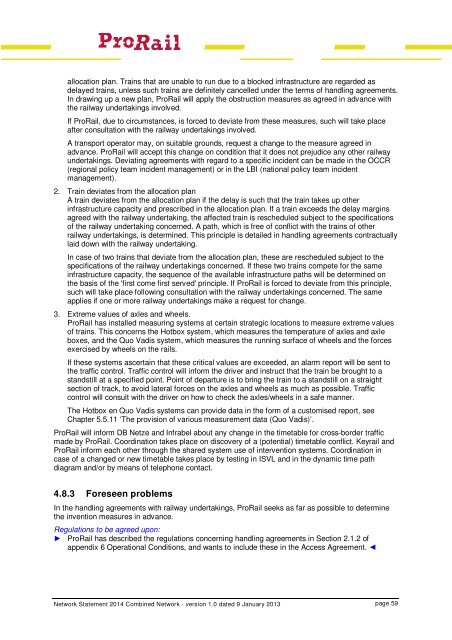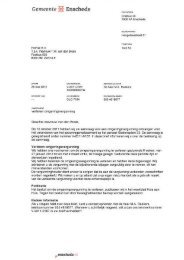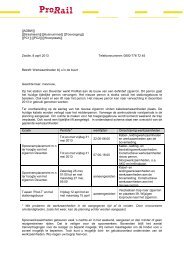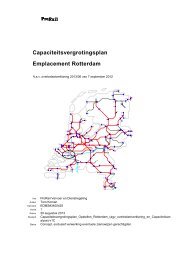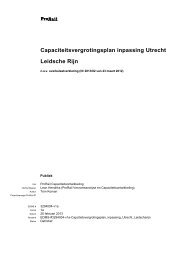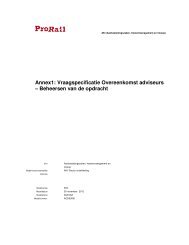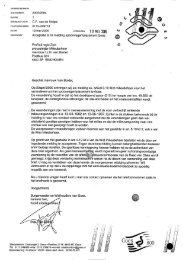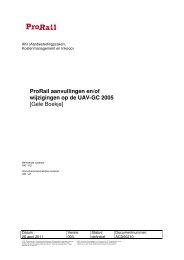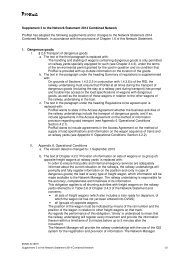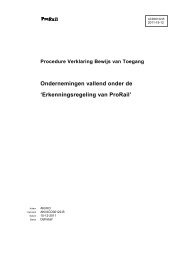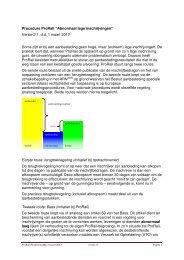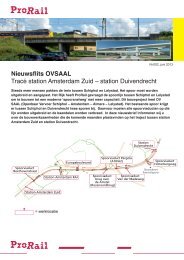Network Statement 2014 - ProRail
Network Statement 2014 - ProRail
Network Statement 2014 - ProRail
- No tags were found...
Create successful ePaper yourself
Turn your PDF publications into a flip-book with our unique Google optimized e-Paper software.
allocation plan. Trains that are unable to run due to a blocked infrastructure are regarded asdelayed trains, unless such trains are definitely cancelled under the terms of handling agreements.In drawing up a new plan, <strong>ProRail</strong> will apply the obstruction measures as agreed in advance withthe railway undertakings involved.If <strong>ProRail</strong>, due to circumstances, is forced to deviate from these measures, such will take placeafter consultation with the railway undertakings involved.A transport operator may, on suitable grounds, request a change to the measure agreed inadvance. <strong>ProRail</strong> will accept this change on condition that it does not prejudice any other railwayundertakings. Deviating agreements with regard to a specific incident can be made in the OCCR(regional policy team incident management) or in the LBI (national policy team incidentmanagement).2. Train deviates from the allocation planA train deviates from the allocation plan if the delay is such that the train takes up otherinfrastructure capacity and prescribed in the allocation plan. If a train exceeds the delay marginsagreed with the railway undertaking, the affected train is rescheduled subject to the specificationsof the railway undertaking concerned. A path, which is free of conflict with the trains of otherrailway undertakings, is determined. This principle is detailed in handling agreements contractuallylaid down with the railway undertaking.In case of two trains that deviate from the allocation plan, these are rescheduled subject to thespecifications of the railway undertakings concerned. If these two trains compete for the sameinfrastructure capacity, the sequence of the available infrastructure paths will be determined onthe basis of the 'first come first served' principle. If <strong>ProRail</strong> is forced to deviate from this principle,such will take place following consultation with the railway undertakings concerned. The sameapplies if one or more railway undertakings make a request for change.3. Extreme values of axles and wheels.<strong>ProRail</strong> has installed measuring systems at certain strategic locations to measure extreme valuesof trains. This concerns the Hotbox system, which measures the temperature of axles and axleboxes, and the Quo Vadis system, which measures the running surface of wheels and the forcesexercised by wheels on the rails.If these systems ascertain that these critical values are exceeded, an alarm report will be sent tothe traffic control. Traffic control will inform the driver and instruct that the train be brought to astandstill at a specified point. Point of departure is to bring the train to a standstill on a straightsection of track, to avoid lateral forces on the axles and wheels as much as possible. Trafficcontrol will consult with the driver on how to check the axles/wheels in a safe manner.The Hotbox en Quo Vadis systems can provide data in the form of a customised report, seeChapter 5.5.11 ‘The provision of various measurement data (Quo Vadis)’.<strong>ProRail</strong> will inform DB Netze and Infrabel about any change in the timetable for cross-border trafficmade by <strong>ProRail</strong>. Coordination takes place on discovery of a (potential) timetable conflict. Keyrail and<strong>ProRail</strong> inform each other through the shared system use of intervention systems. Coordination incase of a changed or new timetable takes place by testing in ISVL and in the dynamic time pathdiagram and/or by means of telephone contact.4.8.3 Foreseen problemsIn the handling agreements with railway undertakings, <strong>ProRail</strong> seeks as far as possible to determinethe invention measures in advance.Regulations to be agreed upon:► <strong>ProRail</strong> has described the regulations concerning handling agreements in Section 2.1.2 ofappendix 6 Operational Conditions, and wants to include these in the Access Agreement. ◄<strong>Network</strong> <strong>Statement</strong> <strong>2014</strong> Combined <strong>Network</strong> - version 1.0 dated 9 January 2013 page 59


